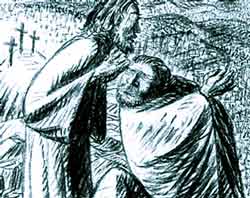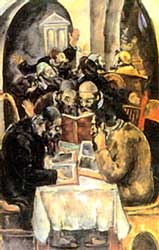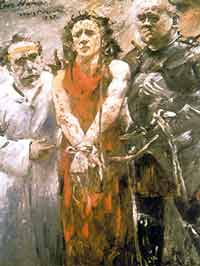|










|
|
Obedient until death.
 |
"Christ Jesus, having taken human nature humiliated
himself and became obedient until death…" (Phil2,
7-8) |
This brief statement of Paul to characterize Jesus' behavior
had certainly a profound influence on the way the Church saw
how to imitate the Master. The link between humiliation and obedience
reinforced the "annihilation" aspect of obedience.
Presented as the best of the virtues for the disciples, it has
inspired in the schools of spirituality some questionable forms
of asceticism because they are so far from the concrete attitudes
of Jesus as described in the Gospel. Sometimes those having authority
use obedience as an easy way, spiritually justified, to obtain
an unconditional submission.
Jesus considered that obedience is primarily the fidelity
to the will of his Father, expressed in the commandments and
precepts of the Law, the signs of the Alliance with God. First,
the fundamental commandment "Listen Israel, the Lord
your God is one, you will love him with all your heart…."
Before the word " you will love" there is the
word "Listen" that means open your heart to the message
that brings life.
Like all humans, Jesus of Nazareth began by receiving the
essential values from his parents as well as food and lodging.
"He was obedient to them" (Luke 2, 51) this
is natural for a child! There is no humiliation in it but instead
a way "to grow in wisdom, in age and in grace"
 |
The development of his personality depended on his relatives,
his friends, the teachers of the Holy Scriptures in the Synagogue
of Nazareth; certainly also in the respect of the civil laws
for the good of his country: to give back to Cesar what belong
to Cesar… Jesus incorporated all this different knowledge
into wisdom of living, according to his own judgment. One cannot
imagine all that happened without difficulties or revolts, without
some misunderstandings as for any human being. One day he was
called to become a prophet. |
On his way, in proclaiming the Kingdom, Jesus continued
to listen, to broaden his views depending on who he met, like
the meeting of people of another religion, of another culture:
the Cananean, the Centurion…He was coming to save the lost
sheep of Israel, progressively he discovered the universality
of his mission.
Suddenly the truth expressed by the intellectuals and the
priests of his people loses its absolute value. When they stopped
midway toward the truth by making sacred what is only a way to
change man's life (the Law, the Shabbat…) Jesus called to
go beyond their truth, where life is flourishing in full liberty
and he said " The Shabbat is done for man, not man for
the Shabbat" The true criteria for a proper judgment,
the only commandment worth obeying is: "Will it save
a life on the Shabbat? Is it allowed that day to do somebody
good?"
One goes from the status of a commandment to the status
to do the good to a human being. This does not go against the
Law but further. It follows the meaning of Jesus:" I
did not come to abolish the Law but to accomplish it"
It is not an easy way; this obedience is difficult, involving
a humble questioning and a permanent tension.
It follows that the High Priest and the Elders, who are
concentrated on the letter of the commandments, are not any more
considered as an ultimate reference; they shall not be unconditionally
followed.
 |
It was a dangerous situation, for them Jesus became a dissident
to be eliminated. His obedience to God was understood as a resistance
directed against them. With a personal authority that nobody
could stop, Jesus chose to practice the request: "You
shall love" in concrete conditions following his own
conscience of a religious man. |
His way of acting so freely is not a mad independence neither
a proud disregard for the authority, like a guru out of control
and unaware of the necessities of the daily life. One judges
the tree by its fruit and Jesus, by obeying, certainly produced
the fruits of the Holy Spirit as described by Saint Paul:"
love, joy, peace, patience, kindness, goodness, faithfulness,
gentleness, self-control" (Gal 5, 22). The ultimate
testimony was given on the day that his enemies put him on a
cross outside Jerusalem.
Faithful to his example, and following the same thinking,
the Apostles, Peter and John facing the Sanhedrin proclaimed:
"We must obey God rather than men" (Act 4, 29).
This obedience in the events of life, an attention to the
great calls of the Gospel, lead the pilgrims of the Absolute
to surpass their own possibilities. |
